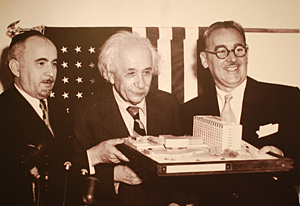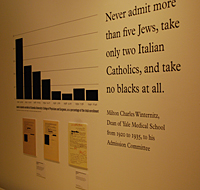

Jews & Medicine
Museum Exhibit Details the Jewish Encounter with Modern Medicine
The memo on display at the Yeshiva University Museum exhibit Trail of the Magic Bullet: The Jewish Encounter with Modern Medicine, 1860 - 1960 is short and to the point: "Never admit more than five Jews, take only two Italian Catholics, and no blacks at all." The document was signed by Milton Charles Winternitz, dean of Yale Medical School from 1920 to 1935.

The College of Medicine's namesake, Albert Einstein, with a model of the institution that proudly bears his name.Having fled the growing anti-Semitism in Eastern Europe in the years preceding World War II, multitudes of Jews that emigrated to the United Sates were met with such informal yet widely enforced quotas, used at the time to limit the number of Jews, African Americans, and other ethnic groups admitted to medical schools and other fields.
In response to this, Yeshiva University President Dr. Samuel Belkin began to advocate and plan for a medical school under Jewish auspices that would be run without quotas based on racial or religious prejudices. That medical school would come to bear the name of the famous Jewish scientist and philanthropist Albert Einstein, whose primary wish was that the Albert Einstein College of Medicine of Yeshiva University would support and welcome all creeds and races. The history and motivation behind the establishment of the College of Medicine is detailed as part of the museum's multi-media exhibit.
"The exhibition is fabulous," remarked Dr. Edward Burns, executive dean at Einstein, during the opening night event. "While medicine was initially considered a religious calling for Jewish physicians, they also distinguished themselves by trying to find the scientific underpinnings of disease. In doing so, they became well-versed in secular knowledge. And when others realized that the Jews' approach was scientific rather than religious, they sought them out."
Trail of the Magic Bullet, which is curated by Josh Feinberg, explores the Jewish relationship with modern medicine by presenting both major scientific and medical contributions by Jewish doctors, and by exploring the influence of the Jewish faith on the ethics of how medicine is practiced.

The practice of quotas for certain ethnicities led to the establishment of Albert Einstein College of Medicine of Yeshiva University – a medical school where all races and creeds would be welcome.The exhibit takes its name from the famous Jewish scientist and Nobel Laureate Paul Ehrlich, widely regarded as the father of chemotherapy, who popularized the concept of selectively targeting disease-causing agents that he called the "magic bullet." One such "magic bullet" - the drug Arsphenamine, which was the first effective medical treatment for syphilis - was discovered in his laboratory.
Beginning with the story of Dr. Ehrlich, Trial of the Magic Bullet details the many other Jews that are considered giants in their fields and whose contributions between 1860 and 1960 resulted in significant medical and scientific discoveries and theories. During that time period, Jews were so predominant in fields such as dermatology and psychoanalysis, the areas were considered "Jewish Sciences."
The medical advances made by individual doctors eventually affected and contributed to public health, and the exhibit continues by examining medical philanthropy within and by the Jewish community through specific groups and hospitals, and how the Jewish faith influenced such efforts.
Following the display relating the history of the College of Medicine, the exhibit addresses various contemporary issues in Jewish bioethics. These include complex issues, such as how to deal with genetic testing that may reveal debilitating illness in an unborn child or what the most ethical approach to end-of-life issues might be in the severely ill. Perspectives of these uniquely contemporary issues are discussed by several Jewish scientists and religious leaders in a film by Ilana Trachtman, Heal, You Shall Heal.
The history of Jewish medicine on display at the Trail of the Magic Bullet demonstrates the impact of these efforts on the health and scientific understanding of the entire global community. The beautifully curated and educational exhibit remains on display at the Yeshiva University Museum until August 12, 2012. The museum is located at 15 West 16th Street, in Manhattan, and admission is free for Yeshiva University (including Einstein) students, faculty, and administration with a valid ID.
Posted on: Friday, July 27, 2012


